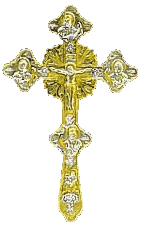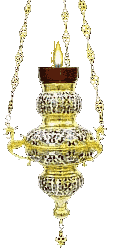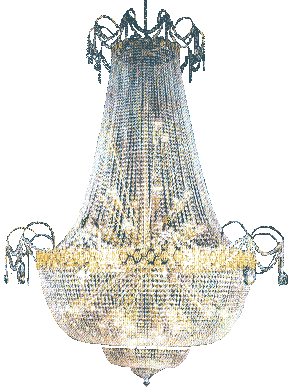The Orthodox Pages THE HIERATIKON THE EASTER SERMON OF OUR FATHER AMONG THE SAINTS JOHN CHRYSOSTOM ARCHBISHOP OF CONSTANTINOPLE
|
||||
|
|
|
|
||
|
|
The Easter Sermon of St. John Chrysostom is according to the typikon recited at the end of Mattins of the Resurrection Service, but as it is a most appropriate and wonderful sermon for Holy Communion, for it completely summarizes the whole meaning of the Resurrection, inviting all to partake of the Pascal table, those who laboured and fasted and those who were slothful and didn't fast, in practice it is read just before Holy Communion.
Whosoever is pious and loves God, let him enjoy this good and cheerful festival. Whosoever is a grateful servant, let him rejoice and enter into the joy of the Lord. Whosoever is weary of fasting, let him now receive his earnings. Whosoever has laboured from the first hour, let him today accept his just reward. Whosoever has come after the third hour, let him with thanksgiving take part in the celebration. Whosoever has arrived after the sixth hour, let him have no misgivings, for he too shall suffer no loss. Whosoever has delayed until the ninth hour, let him approach without hesitation. Whosoever has arrived only at the eleventh hour, let him not fear the delay, for the Master is gracious: He receives the last even as the first; He gives rest to him that comes at the eleventh hour, as well as to him that has laboured from the first; and to him that delayed He gives mercy, and the first He restores to health; to the one He gives, to the other He bestows. And He accepts the works, and embraces the contemplation; the deed He honours, and the intention He commends. Therefore let everyone enter into the joy of the Lord. The first and the last, receive your wages. Rich and poor, dance with each other. The temperate and the slothful, honour this day. Ye who have fasted and ye who have not, rejoice this day. The table is fully laden; all of you delight in it. The calf is plenteous, let no one depart hungry. Let everyone enjoy this banquet of faith. Let everyone take pleasure in the wealth of goodness. Let no one lament his poverty, for the universal kingdom has appeared. Let no one bewail for his transgressions, for forgiveness has risen from the grave. Let no one fear death, for the Saviourís death has set us free. He who was held by death, eradicated death. He plundered Hades when He descended into Hades. He embittered it, when it tasted of His flesh, and this being foretold by Isaiah when he cried: Hades said it was embittered, when it encountered Thee below. Embittered, for it was abolished. Embittered, for it was ridiculed. Embittered, for it was put to death. Embittered, for it was dethroned. Embittered, for it was made captive. It received a body and by chance came face to face with God. It received earth and encountered heaven. It received that which it could see, and was overthrown by Him whom he could not see. Where, O death, is your sting? Where, O Hades is your victory? Christ is risen, and thou art cast down. Christ is risen, and the demons have fallen. Christ is risen, and the angels rejoice. Christ is risen, and life is liberated. Christ is risen, and no one remains dead in a tomb. For Christ having risen from the dead, has become the first-fruits of those that have fallen asleep. To Him be glory and power, for ever and ever. Amen.
The Choir shall then sing the Troparion for St. John Chrysostom.
Troparion to St. John Chrysostom. Grace shone forth from thy lips like a flame of fire to illumine the universe. Thou didst teach us to neglect the treasures of this world. Thou hast shewn unto us the height of divine humility. Thou whose words are for our admonition, O Father John Chrysostom, pray unto Christ the Word that our souls be saved.
And when the Divine Liturgy has come to the end, the Priest shall say the following Dismissal:
May He who is risen from the dead and by death hath overcome death and to them in the graves hath He given life, Christ our true God, by the prayers of His most holy Mother; by the power of the precious and life-giving Cross; by the protection of the heavenly bodiless hosts; through the supplications of the glorious Prophet and Forerunner, John the Baptist; of the holy and all-glorious Apostles; of the holy, glorious and triumphant Martyrs; of our holy God-bearing Fathers; of our father among the saints, John Chrysostom, archbishop of Constantinople; of [Name of the saint to whom the Church is dedicated]; of the holy and righteous progenitors of God, Joachim and Anna; and of all the saints, have mercy upon us, and save our souls: For He is good and loving-kind.
And then this dialogue between the Priest and the People. The Priest, holding the three Resurrection candles in his right hand and the Cross in his left and raising his hands shall cry out triumphantly:
CHRIST IS RISEN.
And the People shall respond with: HE IS RISEN INDEED.
This is said a total of three times. Then the Priest shall say: GLORY BE TO HIS HOLY RESURRECTION ON THE THIRD DAY.
And the People shall respond with: WE WORSHIP HIS RESURRECTION ON THE THIRD DAY.
PRIEST Christ is risen from the dead, by death he hath overcome death, and to them in the graves hath he given life.
The Easter Dismissal and the dialogue is said throughout Bright Week up to and including Saturday of Bright Week.
|
|
||



